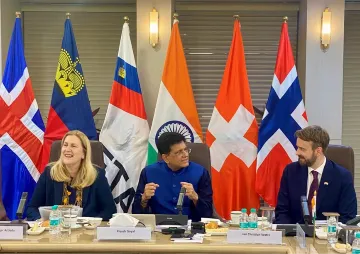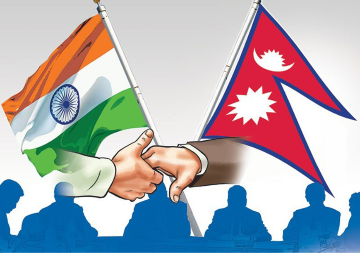Admitting that the government's 'Make in India' initiative will result in increase in carbon emissions as it focuses on manufacturing, and industries, India's Minister for Environment, Forest and Climate Change Prakash Javedkar emphasises the need for developing countries to get cheaper access to green technology on humanitarian grounds, notwithstanding Intellectual Property Rights.

Admitting that the government’s 'Make in India' initiative will result in an increase in carbon emissions as it focuses on growth, manufacturing, and industries, India’s Minister for Environment, Forest and Climate Change, Prakash Javedkar, emphasised the need for developing countries to get cheaper access to green technology on humanitarian grounds, notwithstanding intellectual property rights (IPRs).
The minister reiterated this Indian position while addressing a roundtable on "Technology and Climate Change: Innovation and Partnerships for Transitional Change" on September 23. The roundtable focussed on the policy frameworks required to stimulate technology innovation and partnerships to facilitate technology transitions, and explored the challenges associated with leveraging technology for an effective response to climate change.
Besides the minister, the inaugural session was addressed by Amber Rudd, Secretary for Energy and Climate Change, United Kingdom. The session was chaired by Sunjoy Joshi, Director, Observer Research Foundation.
Javedkar said technology is central to achieving the post-2015 development agenda. He asserted that the crux of the 'Make in India' initiative is to encourage innovation and investment.
He highlighted the importance of devising mechanisms for technology transfer wherein the innovators are rewarded, but the climate change imperative is not compromised. In order for developing countries to contribute optimally, enhanced technology transfer, joint production, R&D, innovation and joint collaborative research are needed.
The minister further stated that technology cooperation between the global north and south should be seen as a win-win proposition. A technology facilitation mechanism was agreed upon in the FFD3 conference in Addis Ababa, and this mechanism is crucial for developing countries such as India to have access to environment friendly technologies as well as support for capacity building, technical assistance and local innovation. Moreover, there is a bias towards large scale mitigation technologies; small scale, effective, adaptation technologies are equally important for developing world. He concluded by commending the UK for their domestic bipartisan commitment to the practice and implementation of carbon budgeting.
Rudd, in her address, emphasised that the UK shares India’s vision. Both countries want sustainable economic growth, which can only be achieved through energy security, low carbon and climate resilient economies. Rudd asserted that saving the planet and promoting growth are not inherently mutually exclusive.
Speaking on low carbon growth, she commended India’s ambitious target to quadruple renewable capacity to 175 gigawatts by 2022. Low carbon growth can be at the heart of PM Modi’s drive for smart cities which can be both technologically sound and climate-resilient. In addition, low carbon growth can make cities and towns more liveable with better air, cleaner rivers and healthier people.
Rudd said a global deal would send a clear sign to researchers, policymakers, investors and businesses that governments are committed to delivering a low carbon economy. Therefore, such a clear signal must be part of a successful deal in Paris. She further elaborated on business investment and collaboration. By the end of 2015, the UK will have invested around £1.3 billion in low carbon research and development since 2011. However, public spending alone cannot fund research and development entirely. The most cost effective way to 'decarbonize' the economy, therefore, will be to stimulate huge private sector investment in technology. Expressing the UK’s interest in working with India on technology and innovation, she stated that the UK is providing £50 million of funding over 5 years on a joint program with India called Newton-Babha.
Rudd concluded by saying Prime Minister Modi’s visit to the UK in November will be an excellent opportunity to build on what already exists and to raise ambition and to show how the two countries can lead the world in low carbon growth.
Sunjoy Joshi summarised the addresses and thanked the ministers for flagging the key issues about not just sharing knowledge, but the need to create new knowledge as well as the need to create new business models and financial arrangements which enable commercial flows of knowledge across the world.
The inaugural session was followed by three panels. The first, on 'Technology in the context of a global agreement,' aimed to explore the current state of play on technology development and transfer in the climate change negotiations and the key challenges and opportunities for Paris.
JM Mauskar, Advisor, ORF, chaired the session and shared why in his opinion, technology is key in the context of climate change. First, climate change is full of uncertainties about the causes; therefore, technology is essential in determining the exact impacts of climate change because adaptation depends on an accurate diagnosis of the impacts. Secondly, the actions taken by the developing countries must be co-terminus with the actions these countries take in regard to their imperatives of poverty eradication and economic and social development.
Henriette Faergemann, EU Climate Counsellor, India, reiterated the centrality of technology in climate change negotiations and added that from the side of the EU and member states, there are already a lot of established partnerships with India which are centred on technology, technology transfer, and transfer of technology development. The EU member states are very involved in several renewable energy sectors (photovoltaic solar, biomass, offshore wind) and the Indian cabinet has decided to allow EU member states to implement offshore wind projects in India.
Prodipto Ghosh, Distinguished Fellow, TERI, explained the technicalities around IPRs from the perspective of developing countries. IPRs may be considered private property but they are not inherently "natural rights". These are rights which have been conferred through international agreements, by which the innovators are given a monopoly over the innovation which has a defined locus in terms of geographical and temporal applications, and covers a certain breadth of application of that technology in return for certain benefits which society accrues. But, TRIPS also contains certain provisions by which considerations of broader societal needs, the rights of the innovator may be curtailed to defined degrees.
In the next panel on, 'Technological transitions and innovation: learning from new centres and sectors' the key lessons from other centres of innovation such as Japan, South Korea and Singapore were discussed.
Masaru Yarime, Associate Professor of Science, Technology and Innovation Governance, University of Tokyo, highlighted that human resources development is crucial but easily forgotten in technology policy discussions. Increasingly there is strong pressure to evaluate the policy outcomes from a commercial perspective; but in the case of government policies it is equally important to pay attention to the human skill - particularly from a long term perspective.
Eugene Yun, Managing Director, P80 Group Foundation, South Korea, shared lessons from South Korea’s "green growth". Yun stated that climate change is an ongoing immediate concern, but as it unfolds, it is also a long-term problem. Policies should have long-term visions. Based on South Korea’s experience, he asserted that strong leadership and larger markets for the green technology are needed to make a significant difference in this space.
Narasimalu Srikanth, Programme Director, Wind and Marine Energy, Nanyang Technology University, Singapore, explained that just because certain technologies worked for certain regions, they cannot be guaranteed to work for all regions. Local contexts are extremely important. Therefore, identifying the right technologies as well as identifying the technological and policy gaps is crucial for each developing country.
![]() Next, Rakesh Basant, Head, Centre for Innovation, Incubation and Entrepreneurship, IIM Ahmedabad, described innovation and spoke on the under-emphasized issue of policies that affect entry barriers and competition. Some choices made by private sector innovators with respect to developing, copying, licencing and adopting technologies may be driven by the nature of competition they face. He stated that the complementarities and conflicts of existing technologies are often missed out.
Next, Rakesh Basant, Head, Centre for Innovation, Incubation and Entrepreneurship, IIM Ahmedabad, described innovation and spoke on the under-emphasized issue of policies that affect entry barriers and competition. Some choices made by private sector innovators with respect to developing, copying, licencing and adopting technologies may be driven by the nature of competition they face. He stated that the complementarities and conflicts of existing technologies are often missed out.
Ajay Mathur, Director General, TERI, addressed the concluding session. Mathur focussed on the possibility of creating the environment that would enable technological change. Mathur highlighted the need for innovative government policies depending on the changing circumstances. He reiterated the need for India to identify the policies that are likely to work in the local context. He suggested that India and other developing countries can acquire the much needed handholding-support for policy development through existing mechanisms in the Climate Change Convention. Mathur concluded by saying that there are opportunities to accelerate the dissemination and use of innovative technologies through better business models, better policies, and more support for the creation of newer knowledge.
Report prepared by Vidisha Mishra, Research Assistant, ORF Delhi.
The views expressed above belong to the author(s). ORF research and analyses now available on Telegram! Click here to access our curated content — blogs, longforms and interviews.




 PREV
PREV

